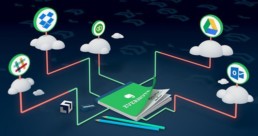A Comparison of Digital Transformations: Blocknet and Evernote
Source: CCN

Blockchain technology. The Evernote app. Two completely different worlds, right? Well, there might be a whole lot more in common than you may think. Before the internet took an irreversible hold on the world, digital note-taking took place on simple programs like Notepad. Notes could be easily taken and saved onto your local—but isolated—machine. As the internet grew, the need to access this type of saved information across multiple devices soon became vital. Eventually, Notepad was usurped by the Evernote app, which utilized the power of “the cloud.” Evernote allowed notes to now become accessible across multiple devices and via peripheral services, including Quickbooks, Dropbox, Google Drive and many more.
As the internet opened the door to a new wave of cloud applications—just like Evernote—Blocknet is creating an internet of blockchains for a new generation of decentralized applications that can interconnect any blockchain to another. Blockchains today are at the cutting edge of technology, yet their isolation is similar to that of the original Notepad app. Specifically, there’s an obstacle that needs to be tackled: blockchains can only communicate with themselves and cannot communicate with any other blockchain. Data cannot be transferred between blockchains. This places enormous limitations on what blockchain technology (as a whole) has the potential to achieve. Blockchains need to evolve in the same way that Notepad lead to Evernote. Blockchains should be able to freely and effortlessly connect with any other blockchain.
The Internet of Blockchains
Blocknet has built an interoperability infrastructure that enables blockchains to connect with one another, creating an “Internet of Blockchains.” The Blocknet protocol gives blockchains the ability to communicate, opening the door for cross-chain applications. By allowing blockchains to integrate with each other, directly chain-to-chain, without being a middleman to the data itself, the Blocknet protocol gives any application the ability to utilize different blockchains. In addition, the Blocknet protocol offers a solution to the issue of...
Redefining Ecommerce security and efficiency through the Elysian blockchain
Source: thetokener.com

Elysian, a blockchain based startup, is all set to create a relationship of trust between the businesses and consumers in e-commerce like never before by addressing the most common shortcomings of this thriving industry. This decentralized ecosystem will drastically transform the standard e-commerce business model by ensuring faster delivery, secure customer data storage, and identity theft protection.
Elysian is making quick inroads towards their pursuit to deliver a decentralized e-commerce platform with innovative security and revolutionary user experience. A blockchain based ecosystem, Elysian will be the first e-commerce platform to integrate blockchain for the secure storage of all customer data and utilize the technological advances such as Artificial Intelligence and Virtual Reality to deliver an unprecedented user experience.
Business to consumer (B2C) e-commerce is a massive global market, expected to generate global sales exceeding $4 trillion by 2021. However, the lack of trustworthy cybersecurity, primarily in the form of identity theft, remains to be a serious concern for the industry. Moreover, the cryptocurrency enthusiasts all over the world are still waiting for an e-commerce platform that will accept cryptocurrency in exchange for all their products and services. From an overall perspective, till now, the industry still has much room for improvement in terms of user experience, specifically by integrating new types of technologies.
Elysian makes e-commerce trustworthy by creating an improved level of data storage security by using the Proof-of-Authority algorithm. This will ensure the creation of an ecosystem with a private blockchain to store encrypted credit card information and other user data securely over a distributed network. With the application of Artificial Intelligence and Virtual Reality, it will allow shoppers the freedom to shop at home in an intimate environment and...



